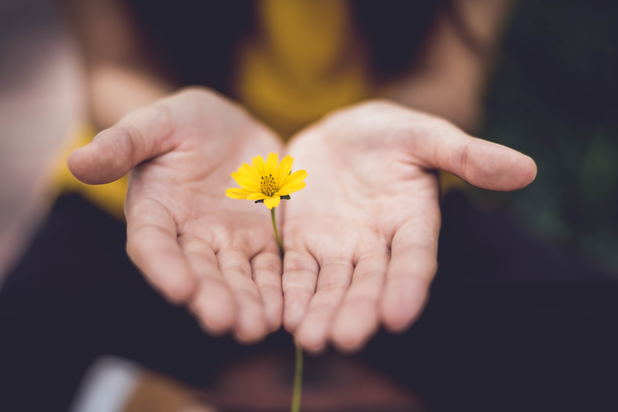We hear a lot about forgiveness in recovery—forgiveness of others and self. However, we may rarely understand forgiveness as a process rather than a simple act. In fact, we may feel pressured to forgive ourselves and others due to a 12-Step program or other specific recovery process. This can lead us to feel further resentment, invalidation or (in extreme cases) a sense of being silenced and a resulting desire to turn our backs on our recovery altogether.
Like grief—another process we learn about and go through in recovery—forgiveness comes in stages that do not have a set duration of time or order. These stages are very much like those involved in the process of grief, and an equal amount of patience allotted for grief is necessary for the process of forgiveness.
Denial
The process of forgiveness—like most anything—begins with denial. Initially, we may deny any hurt feelings or feel numb to the circumstance or situation. Depending on our level of self-awareness, we may not even realize there is anything to forgive.
Pain
At some point, the reality of a painful event or situation sets in. Our hurt feelings begin to surface. We become very aware that we have been betrayed, violated, heartbroken or otherwise wronged in some way. This stage may present with varying degrees of helplessness.
Anger
Once our pain presents, we begin to feel anger toward the person(s) involved in a particular event or situation. This anger is a gift, as it shakes us completely out of denial and helplessness and thrusts us into a stage of self-awareness, self-advocacy, and action.
Victimization
In the stage of victimization, we begin to realize we have in fact been a victim to another person’s hurtful actions or words. We lay justifiable blame on the person we consider to be the responsible party and hold them accountable as the one(s) who chose unhealthy or hurtful behaviors that led to our pain.
Depression
After our experience of being a victim to another’s behavior is internalized, depression sets in. This may present with feelings of deep sadness and bouts of crying uncontrollably, anxiety, a focus on only the negative aspects of life, a negatively skewed perspective that ultimately lumps everyone (or those akin) in the category of the person we hold responsible for our pain, irritability, being quick to anger, lack of interest in people, certain activities, places or things that somehow are connected to the person we hold responsible for our pain, etc. Depression looks different for different individuals, but the overwhelming sense of flooding and deeply uncomfortable emotions is present.
Accountability
After the deep, dense emotions resulting from the situation or event are surfaced and released from us, we begin to see either our own part in the situation or event that led to our pain or the ways in which we too have hurt or violated others to varying degrees. We take accountability for our part but not the part of others. We hold others accountable in this stage too, recognizing that (regardless of our part) we do not have the power to cause someone else’s behavior or control their choices. Thus, we still see their behavior as hurtful and unjustifiable.
Awakening
Once we have cleared the dense emotions that surface through depression (and possibly the experience of revisiting the other previous stages numerous times), accept our accountability and place others’ accountability appropriately, we empower and center ourselves in a way that allows for a shift of perspective and a higher level of consciousness. We begin to see how the painful situation or event blessed us in some way, trained us for an important aspect of our lives or taught us something about ourselves or those we may find we are on this planet to serve.
Additionally, we see the person we once blamed for our pain as an invaluable teacher or the creator of opportunity for us to transform our lives. We shift our perspective to one of gratitude and reach (without judgment for the previous stages of our process) a higher level of consciousness.
Compassion
As we begin to live from a space of gratitude regarding the person we once blamed for our pain, as well as the event or situation, and refuse to judge the ways in which we have moved through the previous stages of the process, we raise our vibration to one that is fully aligned with unconditional love and compassion for others and ourselves. As such, we begin to see ourselves in others and others in ourselves. We see and accept our pain and ways in which we dealt with it in the previous stages of the process and realize the pain of others and the stages in which they may have been stuck, possibly for a lifetime. This allows us to feel a sense of compassion for all parties involved—including ourselves—and permits full forgiveness.
The Role of Forgiveness in Recovery
Forgiveness of others prevents resentment—a slippery slope for relapse. That said, forgiveness as a process means it is not as simple as flipping a light switch. Therefore, just as with the process of grief, it is vital to seek the support of a helping professional to assist with the process of forgiveness. This helps to avoid the potential of getting stuck in or refusing to move from a specific stage of the process—like anger, victimization or depression—which could easily trigger a relapse.
Forgiveness of self prevents further self-loathing, guilt and shame—the perpetuating factors in the detrimental cycle of pain. Additionally, forgiveness of self is an act of self-love and a big step toward an unconditional love of self—the ultimate key to a successful recovery.
Though forgiveness is a necessary process for a successful recovery and therefore a gift you are giving not necessarily to others but to yourself, it is not something you should force or rush. Regardless of where you find yourself in the stages of the process, you are in the process. That’s a start.
|
If you or someone you know is seeking help from addiction, please visit our directory of treatment centers or call 800-891-8171 to speak to a treatment specialist. |








